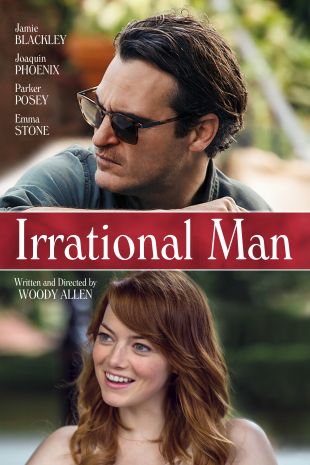
For viewers familiar with Woody Allen's body of work, Irrational Man provides many familiar themes and tropes. The title cards and opening credits are presented in the understated yet unmistakable font he typically uses. There's the requisite curmudgeonly intellectual who seems to attract all of the women in his orbit, despite his flaws and lack of prudence. There's music that seems to drift into the film as if it's a part of the landscape, and, as is the case with just about all of his pictures since Annie Hall, there's high-minded dialogue that openly contemplates the tribulations of everyday life and "what it all means." Woody also includes a murder plot this time around, a story line he's used in such previous movies as Crimes and Misdemeanors, Match Point, and Cassandra's Dream.
Abe Lucas (Joaquin Phoenix) is a somewhat radical philosophy writer and professor who stumbles into a new job at a pleasant liberal-arts college, flask in hand and highly unsocial disposition to boot. Nevertheless, two vastly different women -- Rita (Parker Posey) and Jill (Emma Stone) -- take a liking to him. The former, a fellow professor, respects his work and his romantic ideals. The latter is still a student (Abe is immediately hounded by rumors of dating pupils), but she sees him as an inquisitive mind who represents all of the aspects of life that she yet to experience; she falls in love with him as a result, much to the chagrin of her well-to-do boyfriend Roy (played by Jamie Blackley and written as a tossed-off afterthought).

Looking for something to believe in, Abe eavesdrops on a conversation while at a diner with Jill, and learns that a corrupt judge stands in the way of a woman being able to retain custody of her children. Inspired to help this poor woman, Abe hatches a plan to murder the judge. His new mission revitalizes him, giving him a new lease on life and a desperately needed distraction from his typically glum worldview. As he draws closer to both Rita and Jill, however, circumstances force him to take a closer look at his moral compass, the true consequences of his actions, and his resolute, supposedly proactive new ethos. Soon enough, revelations emerge that bring about drastic changes for all three of them.
The movie starts off very slowly, with more than a little navel-gazing. Allen, an iconic director whose oeuvre already contains a staggering number of accomplishments, is in no rush to establish any sort of exciting action at the beginning, and that ends up being to the film's detriment. Set in the world of academia, the already high-minded tone becomes even more grating during the opening scenes, with Abe dropping conceited bon mots such as "anxiety is the dizziness of freedom" and Jill excitedly talking about her seemingly insane professor with wide-eyed zest. Even Allen seems to recognize the leaden nature of some of his bits of verbal repartee, as evidenced by a review of Abe's writing from Jill's mother: "It's a triumph of style...its substance doesn't stand up to scrutiny."
After Abe decides to take control of his life, the rest of the plot follows his lead and the movie starts to improve. Phoenix steals the show here, continuing his string of successful performances (which include his work in Her, The Master, and Inherent Vice) following the baffling misstep of the faux-documentary I'm Still Here. Although he isn't given much to work with, his character's existential rebirth is transfixing, and his mannerisms and ability to utterly inhabit any role lend Abe an air of arresting uniqueness. Emma Stone tries to make Jill a study in both limitless potential and vexing naiveté, but despite her character's voice-overs, she isn't given the material to turn Jill into anything more than an impressionable fangirl before the film reaches its finale. Parker Posey, who has proven herself as a valuable performer for auteurs ranging from Christopher Guest to Louis C.K., is wasted here as a one-note caricature of a wild, unsettled woman who's longing for more. The lack of depth afforded to Rita by Allen's script gives credence to those detractors who would argue that the director has a tough time writing interesting and realistic roles for women.
Allen, thankfully, pays more attention to the plot, which will hold viewers' interest and does an adequate job of exploring the only philosophical theme the movie presents: how we should behave ethically after we realize that we may not have control over our own fate. Irrational Man is sometimes compelling, especially when it focuses on Abe's enthrallment with his murderous quest. Ultimately, it doesn't reach the level of Allen's classics, although Phoenix might make the film worth seeing for the director's fervent fans.
